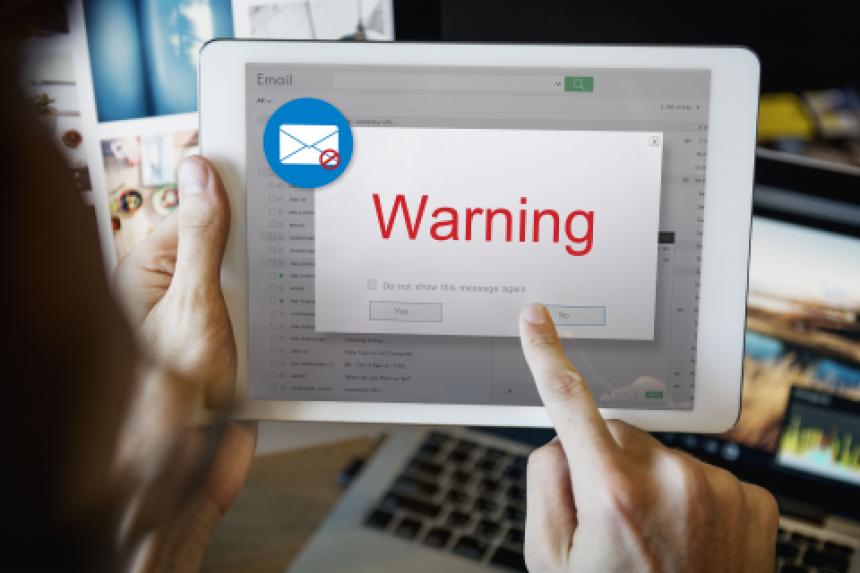
According to the FTC, nearly 2.7 million Americans reported some type of financial fraud last year, losing approximately $905 million. These scams occur in many different ways – over the phone, online or in person. To help avoid becoming a victim of a financial scam, let’s take a look at the five most common scams in the U.S. and how to steer clear of them.
Scam #1: IRS Imposter Fraud
This type of fraud occurs when someone contacts you either by phone, mail, email or text message pretending to work for the IRS. Typically, this type of scam occurs in a couple of ways:
- You receive a call stating you owe taxes and must repay the debt immediately - using a prepaid debit card or wire transfer - or you’ll be arrested; or
- You receive an email or text message asking you to verify personal information relating to your taxes. The message will include a link to an unknowingly fraudulent form or website.
You can help protect yourself by …
- Hanging up the phone. According to IRS.gov, the IRS will never demand that you use a specific payment method, such as a prepaid debit card, gift card or wire transfer. Also, the IRS will not ask for your debit or credit card numbers over the phone.
- Disregarding or deleting the email or text request for information. The IRS will never ask you to verify personal information by email or text or to visit a special website.
Scam #2: Debt Collection Fraud
This type of scam occurs when an offender, pretending to be a debt collector or law enforcement agent, calls or emails you to collect on a debt that you don’t actually owe. The criminal suggests you repay the debt immediately over the phone or through wire transfer.
You can help protect yourself by …
Knowing what you owe – that way, if someone calls demanding payment, you’ll know if it’s a legitimate collection call. Notify your creditor immediately to let them know about the communication.
Scam #3: Charity Fraud
Some criminals make up fake organizations (especially after a major tragedy or natural disaster) to solicit donations. They will typically call you by phone or use a fake website to ask for a contribution.
You can help protect yourself by …
- Validating any charity prior to donating to it. You can do so by checking with your state’s Consumer Protection Office or the Better Business Bureau.
- Avoiding cash donations. If you donate to a charity, use a check or credit card for your records.
Scam #4: Email Phishing Schemes
A phishing scheme is when fraudsters send emails pretending to be legitimate businesses, such as banks, popular businesses, or places you may frequent. They typically ask you to update personal information, such as bank account numbers, Social Security numbers, etc., for their records by downloading an attached form or clicking on a link. The emails and websites (or forms) look authentic, consequently tricking you into entering your personal information as directed - your information is then compromised.
You can help protect yourself by …
- Never opening an attachment or clicking on a link or form in an email you don’t recognize.
- Reporting the email to the business that supposedly sent it to you. They will be able to verify it’s authentic. BancorpSouth will never ask you to update your personal financial information by email – nor will most other legitimate financial institutions or businesses.
Scam #5: Lottery or Prize Scams
You may receive notification that you won a lottery or prize (typically one you’ve entered). You’re asked to send money to the lottery or sweepstakes company to cover certain taxes and fees. Once you do, your financial information has been compromised.
You can help protect yourself by …
- Checking the postage on any mailed prize notice - if it’s bulk rate, it’s probably a scam.
- Remembering whether or not you entered the contest. If you can’t remember, you probably didn’t enter it, and it’s likely a scam.
- Contacting the actual company referenced to verify the prize notice.
No matter who you are, you’ll likely receive a fraudulent phone call, email, letter or text at some point in your life. Remember, if it sounds too good to be true, it probably is. Be diligent in protecting your account and personal information. Review your transactions regularly using mobile or online banking, and take advantage of email or text alerts to keep you informed about your account. The more you stay on top of your accounts, the less likely you’ll experience a significant loss due to fraud.
To learn more about the Fraud Alert program at BancorpSouth, click here, or call 888-797-7711.
© BancorpSouth 2018

